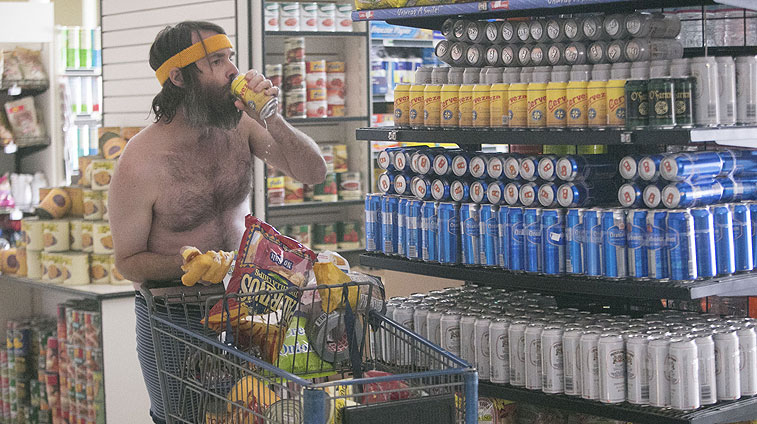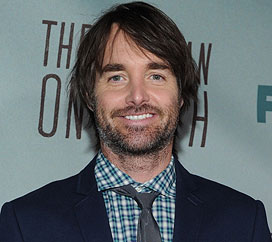
Dude, Where’s My Civilization?
Will Forte, star and showrunner of The Last Man on Earth, talks about plans for season two of his post-apocalyptic Fox comedy and how to make the end of the world funny.
 Frank Micelotta/Fox
Will Forte
Frank Micelotta/Fox
Will Forte
I want to put out there what I would want to see if I was a viewer. But then again I have a weird sense of humor and not the best taste.
If you trust Will Forte’s version of the story, his involvement with the hit post-apocalyptic Fox comedy The Last Man on Earth was a simple case of falling up.
As he tells it, his friends Phil Lord and Chris Miller, best known for The Lego Movie as well as 21 and 22 Jump Street(s), signed a deal with 20th Century Fox, so they called him in for what he thought was a routine television writing gig. But in the middle of developing Last Man, Forte experienced a love connection with the show’s anti-hero protagonist, Phil Miller. (Phil, Miller – get it?)
“As we were coming up with the pitch and writing the pilot I got really attached to the character,” he explains, “so I brought it up to those guys, what would they think about me being the character?”
Happily, they agreed – a smart move considering the show was recently picked up for a second season with Forte continuing his acting and showrunning duties.
“That definitely wasn't super planned out from the beginning – and that's how I make most decisions,” the comedian adds, suggesting that his success hasn’t impacted his sense of Zen. “I don't really think about it and see what happens.”
Why did you pick that moment to start the series, Phil’s return to town?
I feel like I always like starting at a point where there are some questions as to what exactly is going on. A lot of times to the detriment of the thing I'm working on, I like a little bit of mystery in there, so it just felt like a nice starting spot. You could have started earlier and seen the virus working its way through society. There was a point where we had some flashbacks, where they showed how the virus was affecting people in kind of a subtle way. It was a normal scene, but with people wearing a mask.
We certainly had a lot of time to think about it, but I don't think that there was ever a point where we considered changing our starting point, that always just seemed to be the right way to go.
One great thing about the show is the whole “dude doing crap that any guy would do if he was left alone,” like throw bowling balls at fish tanks. How did you balance his hijinks with progressing the story?
It's a lot of trial and error. You obviously have to get in there and deal with both sides of it; the positives and negatives, so it felt like if you have a certain degree of the fun stuff it buys you a little bit of time to deal with the serious stuff also. So it's just finding the right rhythm of getting the fun in there and then dealing with the emotional side of it and the despair and loneliness.
They serve each other.
Yeah. All those things give a context to the sadness that he's experiencing in between these wish fulfillment things, which puts the wish fulfillment stuff in a different context. It seems a teeny bit sadder than if he was totally having a blast in between. Those wish-fulfillment things would have seemed a lot happier.
Some guy on IMDb suggested Phil is stereotypical, but I don't agree. I'm a pretty enlightened guy and I would totally blow things up and make margarita swimming pools and stuff. Did you think about stereotypes at all when you were creating the show?
It's hard to tell a story in 21 and a half minutes, and we had in our head very fully fleshed out versions of who these people are, but automatically had to take some shortcuts. At a time, I was wondering if we should ask to make the show an hour long, because we would just have so much stuff in each episode. An hour might have been too long for us, but it's tricky trying to get everything in there in 21 and a half minutes, you find you've got to cut a bunch of jokes, you've got to cut whole scenes that do a lot of explaining, so it's tricky.
I'm excited about getting to season two. I feel like we're learning as a group how to tell a more efficient story. There is just a ton of lessons we learned. I wrote for a long time on sitcoms, but I was a lower level writer, and so to jump in and be leading the room, it was definitely a new experience. There are certain decisions that we made that were risky and some of them paid off and some of them seemed like people weren't as into – and I live with all that. I'm super proud of it, but I also know that I learned so much and look forward to starting up again and using all these lessons we learned to make the stories even better.
I don't think he understood how you deconstructed Phil way down to this elementary man. He's just a stack of porn away from being an ape. Then as you start introducing new characters into the show you're building him back up again. He becomes more dimensional because he has to, because that's how society works, right? Was that your intent?
It's so funny, I never really thought of it. To me they were just ideas in my head, it felt like this is what a person might do. It's a comedy so I definitely wanted realism in there but it's also supposed to be a funny show.
The thing that most interested us about the show is what would happen if this scenario were to unfold, like how would that change you as a person? There are so many rules and laws out there that just don't make any sense at all when you're dealing with six or seven people – what do you keep and what do you throw away? As much sense as it makes there will be people in your society who just want to cling to the old traditions even if they don't make sense. That was the stuff that really interested us. Going into season two we'll be dealing with a lot of that stuff that we didn't get to deal with in this first season.
Being somewhat OCD I often watched the show and think about, Well, what happens when they run out of canned goods or what happens when they run out of gasoline? Are you thinking about how the infrastructure will continue to decay?
That's always been a fun part of the show. I'm sure that's something we'll be talking about, yes, as this infrastructure is decaying you've got this group of people who want to rebuild society, or at least keep it the way that it was. These people who are ill-equipped to really handle any kind of construction, but who are tasked with trying to get electricity going again, with trying to get some kind of workable plumbing system. So that's kind of the fun of it. I consider myself a not stupid person, but I have no idea how to do that stuff. The people in this writers’ room are as smart as they come, and they're all wonderful people, and they have no idea either, so that's the fun in it to us, being like most people in the world and having no clue what we're doing.
In a lot of other survivalist type shows, suddenly everyone seems to know what to do. “Where did you learn that? How did you build that car, Mad Max?”
Yeah. Oh my God, I'm useless when it comes to anything. I couldn't even change my oil in my car. Actually, I could change my oil in my car, and I can change a tire but then after that, spark plugs, no idea. Do spark plugs even exist in cars anymore?
Not sure. Next question: Phil is obviously an anti-hero, but still likeable. How do you keep that jerk/likable balance going?
I don't know, I don't even know that we've done it. I certainly know that when Phil starts to show the more flawed parts of his character, certainly it's polarizing. Some people aren't interested in watching the show anymore, some people love it. We just did whatever we thought would serve the story and I would hope that people would realize that nobody is perfect, everybody has positive and negative sides to their character. We just thought “Oh, let's experiment with this,” and it felt like the right way to go. I love it, but it's certainly not for everybody.
No, but that's the nature of comedy.
Yeah. I want to put out there what I would want to see if I was a viewer. But then again I have a weird sense of humor and not the best taste, so what I like is not always going to be what everybody likes – I have proven that in all the things I've done that have bombed. So it's a big learning experience making these decisions that affect how people feel about your show, but at the end of the day you've got to do what makes you happy and just hope that people like it. I have no regrets.
You must feel pretty rewarded that this show connected with audiences so well.
Oh yeah. I've never really been in an experience where people have watched something that I did and where I played a major role in it, so it was very, very exciting to be in this situation. It was so much work though, I had no idea how much work it was going to be. I knew it was going to be a lot of work, but this was a year of my life!
And it's going to be another year.
Yes. The good thing is we've learned so many lessons, we've really worked as this nice, cohesive unit, all the writers and the actors and this wonderful crew, so we have developed a shorthand now; I feel like it's going to be less work. It'll be, still, a tremendous amount of work, but we'll just be able to do it more efficiently.
